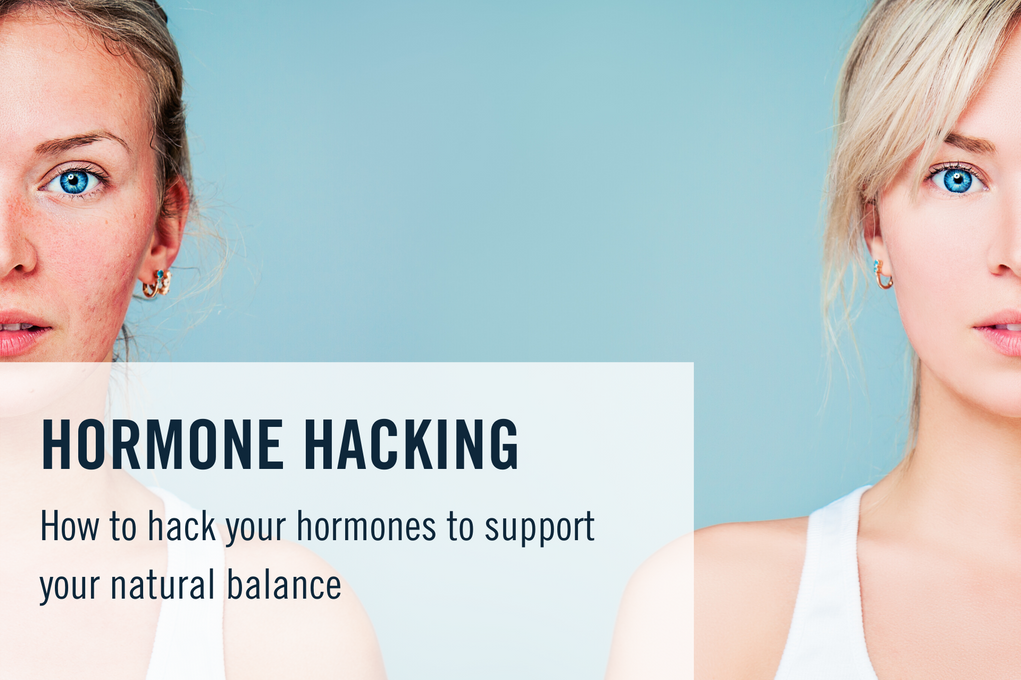Hormone Hacking: How to hack your hormones to support your natural balance
3rd February 2020 / Health
Hormone Hacking: How to hack your hormones to support your natural balance
Emily Shannon

Hormones are a hot topic at the moment, and with good reason! It’s now thought that 1 in 2 women are dealing with hormonal imbalance of some description. There’s no way around it, happy hormones are essential for good health! Balanced hormones are a large contributor to reaching, and also maintaining optimal health as they influence our health and wellbeing in a variety of critical ways.
What are hormones? They’re chemical messengers that travel through the bloodstream looking for specific target receptor sites to bind to. They have profound effects on our physical, mental and emotional health - we’re pretty much run by them, and that's men and women! This February we want to celebrate hormones and female health, so stay tuned for a full month packed with everything you need to know about female health!
When our hormones are out of sync, then the body is out of balance, and this can leave you feeling a little out of sorts. If you’ve ever experienced pesky hormonal related symptoms, you’ll know it can really have an impact on both our physical health as well as how we feel day-to-day. This is because our hormones play a fundamental role in so many different functions in our body, from the maintenance of our blood sugar to our heart rate; growth and development, as well as metabolism. The menstrual cycle, by which hormones are most commonly associated with, are just one piece of the puzzle.
The Endocrine System
Firstly, let’s start where all hormones do, the endocrine system! This is the main piece in the hormone puzzle, it provides us with a strategy to maintain hormonal balance. Our endocrine system is a dynamic hormonal internal ecosystem. The next important part is our endocrine glands, these include:
- Hypothalamus
- Pituitary
- Thyroid
- Adrenals
- Pancreas
- Ovaries
These are known as target glands. In order to work efficiently, they all work together, not in isolation. They communicate through a process called negative feedback. The hypothalamus scans the bloodstream for hormones that one of the target glands have produced, checking to see what needs to be adjusted. This is then picked up by the pituitary gland which then communicates to the appropriate target gland the next message. When hormones are out of balance, this series of chemical messages can’t perform at its best, which often leave the body over or under compensating, which results in the negative side effects that we associate with our ‘hormones’. It can increase the severity of symptoms of PMS, weight gain, hormonal acne, low energy levels, these are just some examples.
The primary job of the endocrine system is to safeguard the transport of glucose to the brain, heart and muscle tissue - using hormones. If glucose transport is disrupted, major shifts in endocrine system function occurs which can leave the body open to unpleasant side effects of hormonal imbalance that we mentioned above
Why should we ‘hack our hormones’?
Don’t worry though, the great thing about our hormones, is that most of the time they’re in our control. Which means that we are ‘hack our hormones’. We can support our bodies to keep our hormonal balance where it should be. What’s even better is, you’ll feel great! You’ll be supporting your natural hormonal cycle, which could supercharge your energy levels, boost your mood, support weight loss, reduce hormonal acne plus so much more. Sounds pretty good right?! Even better that some simple changes could really help!
How to ‘hack your hormones’
Support your blood sugar balance
Our endocrine system works at it’s best when our blood sugar is balanced. This is because if it’s not, our body is constantly having to overcompensate to maintain balance which results in hormonal imbalances. Ditching foods that cause our blood glucose to spike is hugely important, these include simple carbohydrates like white bread, pasta and rice; instead switch it up and go for the brown/whole grain alternatives. Equally, when your blood sugar frequently drops too low - our endocrine system has to work harder which as we know, isn’t good for hormonal balance. Avoid skipping meals and make sure you’re always equipped with healthy snacks like fruits, veggies, nuts and seeds to help support your blood sugar levels.
Combat stress
The modern world constantly puts our body into a state of stress, whether that be meeting deadlines at work, a busy commute or just scrolling on our phones. When are bodies are experiencing chronic, low levels of stress this puts our adrenal glands into overdrive.
Our adrenal glands support our bodies with all things stress related, so as you can imagine, they’re often in constant use, with a recent survey suggesting that a whopping 81% of women are stressed on a daily basis. Our adrenal glands respond to stress by releasing hormones cortisol and adrenaline - this is part of the ‘fight or flight’ response. When our body constantly has to combat chronic stress, it means that too much cortisol is being secreted by the adrenal glands, which can cause adrenal fatigue. There are some easy ways to help combat stress like planning ahead (if you need some top tips head over to our blog here), listening to podcasts or reading on your daily commute, making time for yourself to unwind and making sure you get plenty of exercise.
Go green!
Non-organic foods and beauty products contain xenoestrogens. These pesky chemicals mimic estrogen in the body. They’re identical to the structure of estrogen so they bind to estrogen receptor sites which increases the overall level of estrogen in the body, which results in hormonal imbalance. Xenoestrogens can be found in plastics, some beauty products, household cleaning products as well as non-organic meat and dairy products. To reduce xenoestrogen exposure, go green! Buy organic, if possible everything from your meat, dairy, fruits and veggies to your bathroom cabinet.
Supplement to replenish micronutrients
Hormonal imbalances and exposure to a high chemical environment filled with xenoestrogens as well as being hormonal birth control, for example the oral contraceptive pill can deplete micronutrients that are essential for maintaining hormonal balance. Alongside a healthy, well-balanced diet supplementing with these key supplements will be a great start:
- Magnesium - Magnesium is critical for over 300 different enzyme-based reactions within the body. More specifically, magnesium helps support thyroid hormone production, prevents the creation of excess cortisol and helps to control insulin production.
- Vitamin D3 - Vitamin D helps support insulin regulation. Evidence also suggests that vitamin D can help combat estrogen dominance.
- Omega 3 - Omega 3 has been shown to help regulate hormonal fluctuations boast potent anti-inflammatory properties.
- B Complex - B vitamins have a wide range of functions within the body, specifically they help to support liver function, supports serotonin production with vitamin B6 helping detoxification of estrogen and progesterone.
- Probiotic - The microbiome helps to support hormone regulating, specifically estrogen. Dysregulation of estrogen can cause estrogen dominance which is the main cause of symptoms associated with hormonal imbalance including PMS, PCOS and some estrogen-led cancers.
- Vitamin C - Vitamin C helps to support liver detoxification, if the liver is working optimally then it’s able to effectively metabolise excess hormones and toxins.
It is also really important to consider the kidneys and liver, which are the main organs that help to support detoxification, the body’s natural mechanism to eliminate substances that the body no longer needs. Helping support these two organs means that detoxification within the body is very efficient, which can support hormonal balance.There are so many ways that we can support detoxification by including plenty of liver-loving veggies from the cruciferous family, these include cauliflower, brussel sprouts, kale and broccoli as well as taking a vitamin C supplements like our vitamin C & bioflavonoids.
Fibre is also very important for supporting hormonal balance. The main role of fibre is to bind to excess hormones and toxins so they can be excreted before that start to build up in the body causing imbalances. The reference nutrient intake for dietary fibre is 30g per day, however the latest figures show most people are only reaching 11g per day. Increasing dietary fibre is essential, so make sure you pack your daily diet with plenty; some of our favourite sources are beans and pulses, wholegrain, nuts and seeds, fruits (including berries, oranges, pears and melon) and vegetables (including broccoli, carrots and sweetcorn).
We’re talking about women’s health all February, because here at Link Nutrition we think it’s so important! So you can expect more exciting content, a Q&A with nutritional therapist Libby Limon and a whole blog dedicated to PMS! Make sure you don’t miss a thing by giving us a follow on Instagram and Facebook and signing up to our newsletter - you can find the link below!
From The Blog
-

25th February 2025 / Health
Empowering Women’s Health: Key Supplements for Well-being
Women’s health is a lifelong journey, with each stage presenting unique nutritional and wellness needs. From maintaining energy levels to supporting hormonal balance and bone health, the right comb...
Read article -

17th February 2025 / Health
Empowering Women’s Health: Lifestyle Tips and a Key Supplement for Perimenopause and Menopause
NaomiWomen’s health evolves through various life stages, and the transition into perimenopause and menopause brings unique challenges. During these phases, hormonal fluctuations can lead to symptom...
Read article -

10th February 2025 / Health / Products
The Best Foods and Drinks to Help Your Body Recover from Burnout
Burnout is a growing issue in today’s fast-paced work culture, leaving many people feeling exhausted, overwhelmed, and depleted. While rest and self-care are essential, nutrition plays a crucial ro...
Read article



